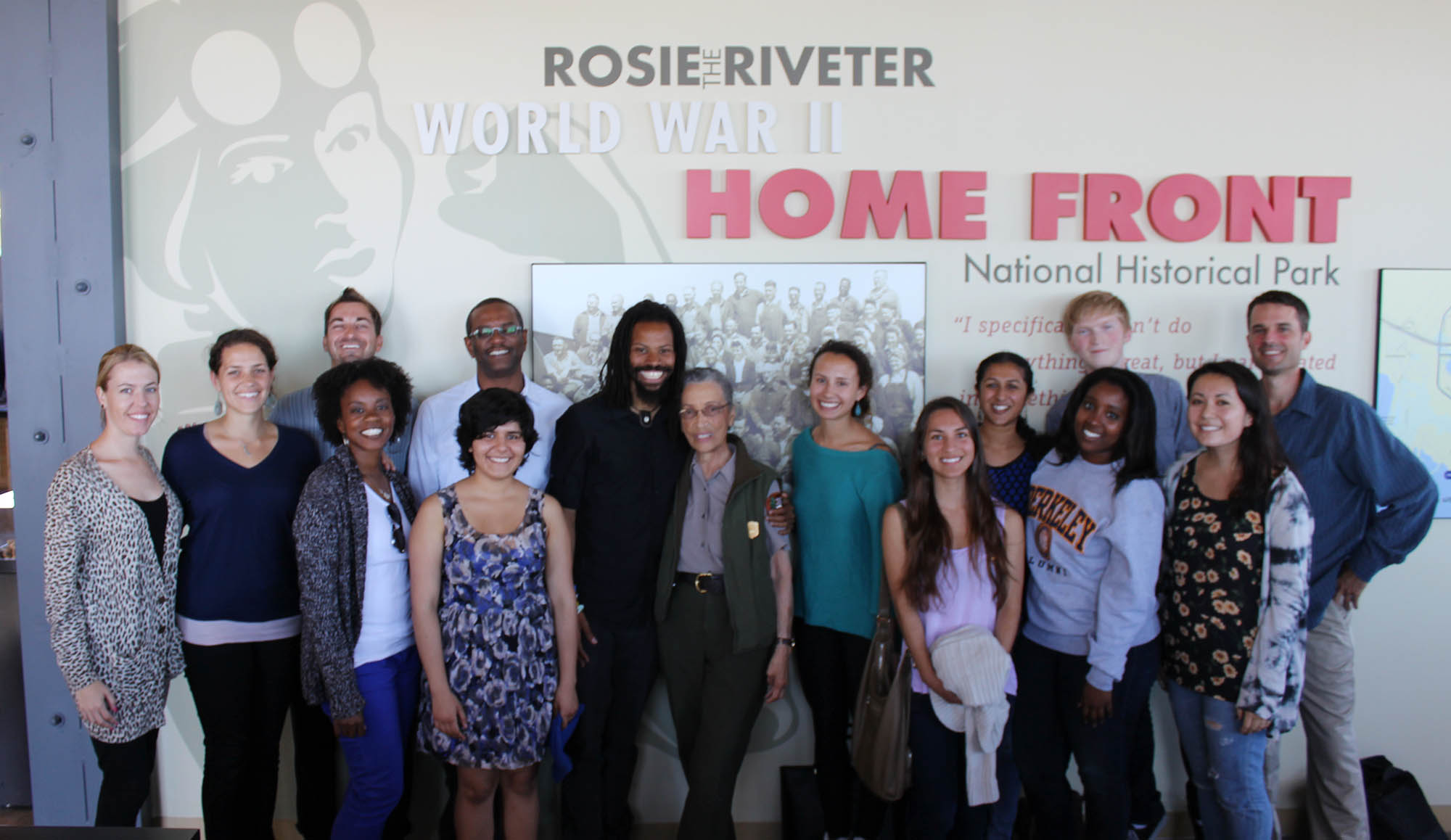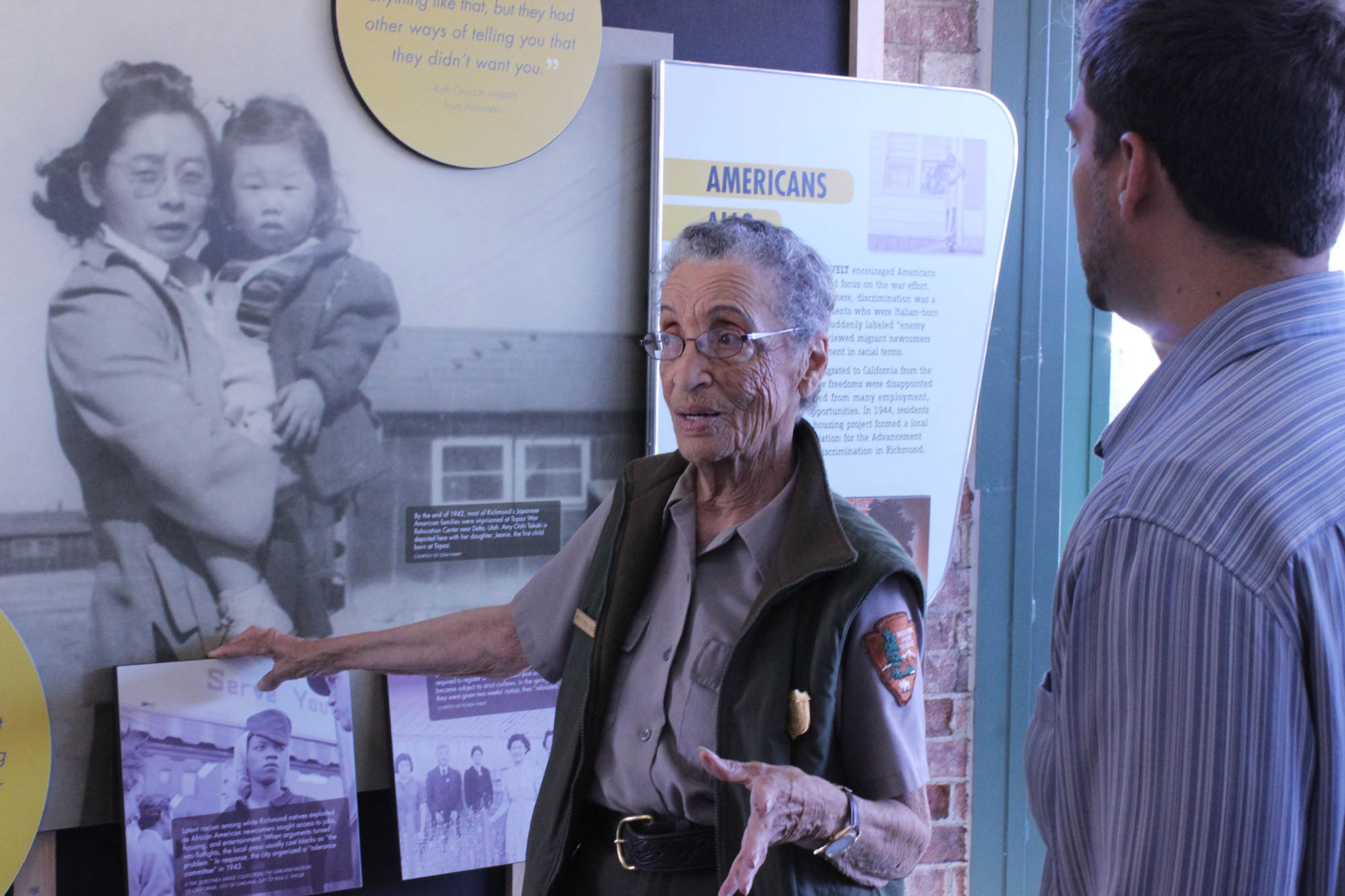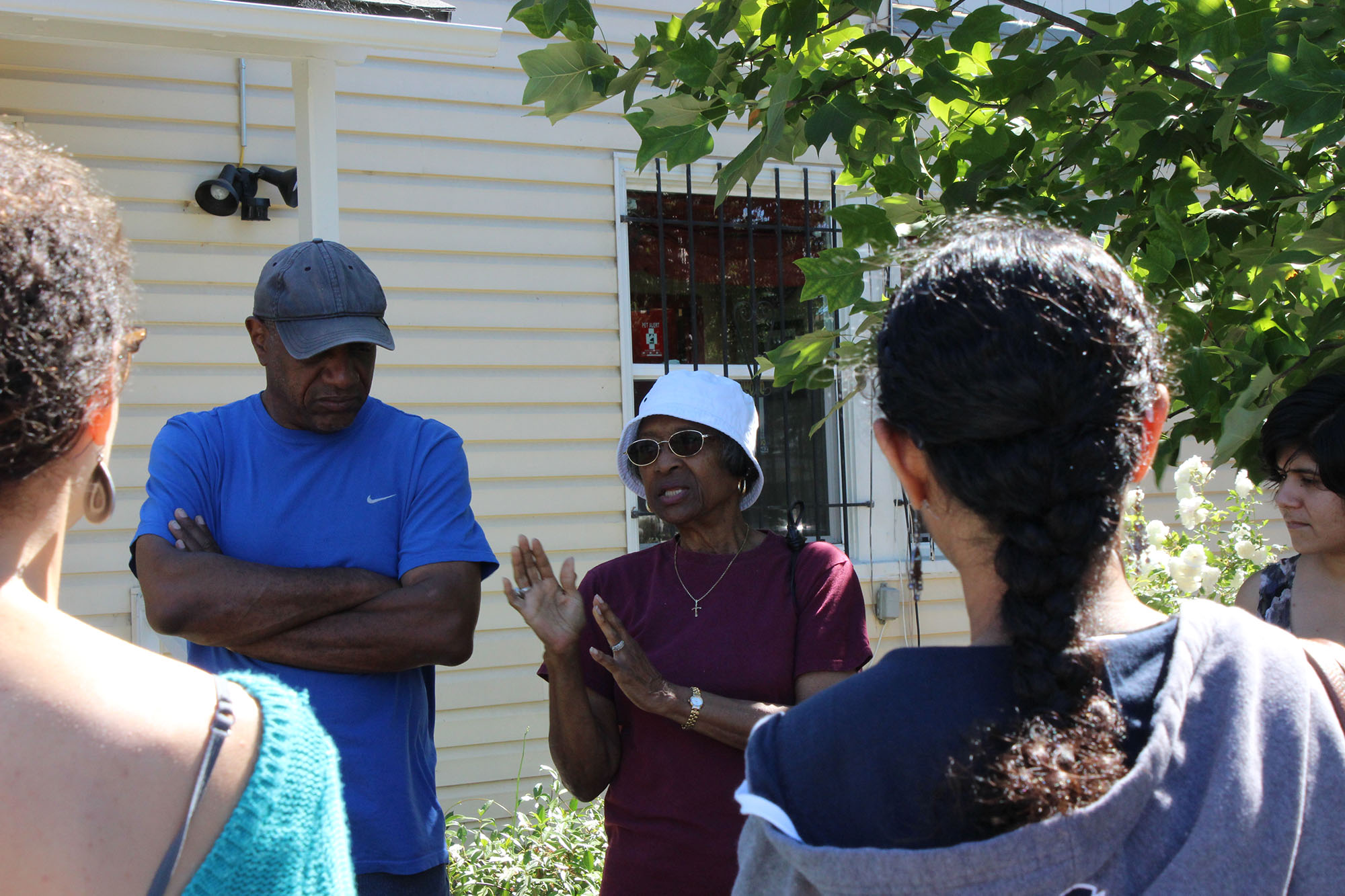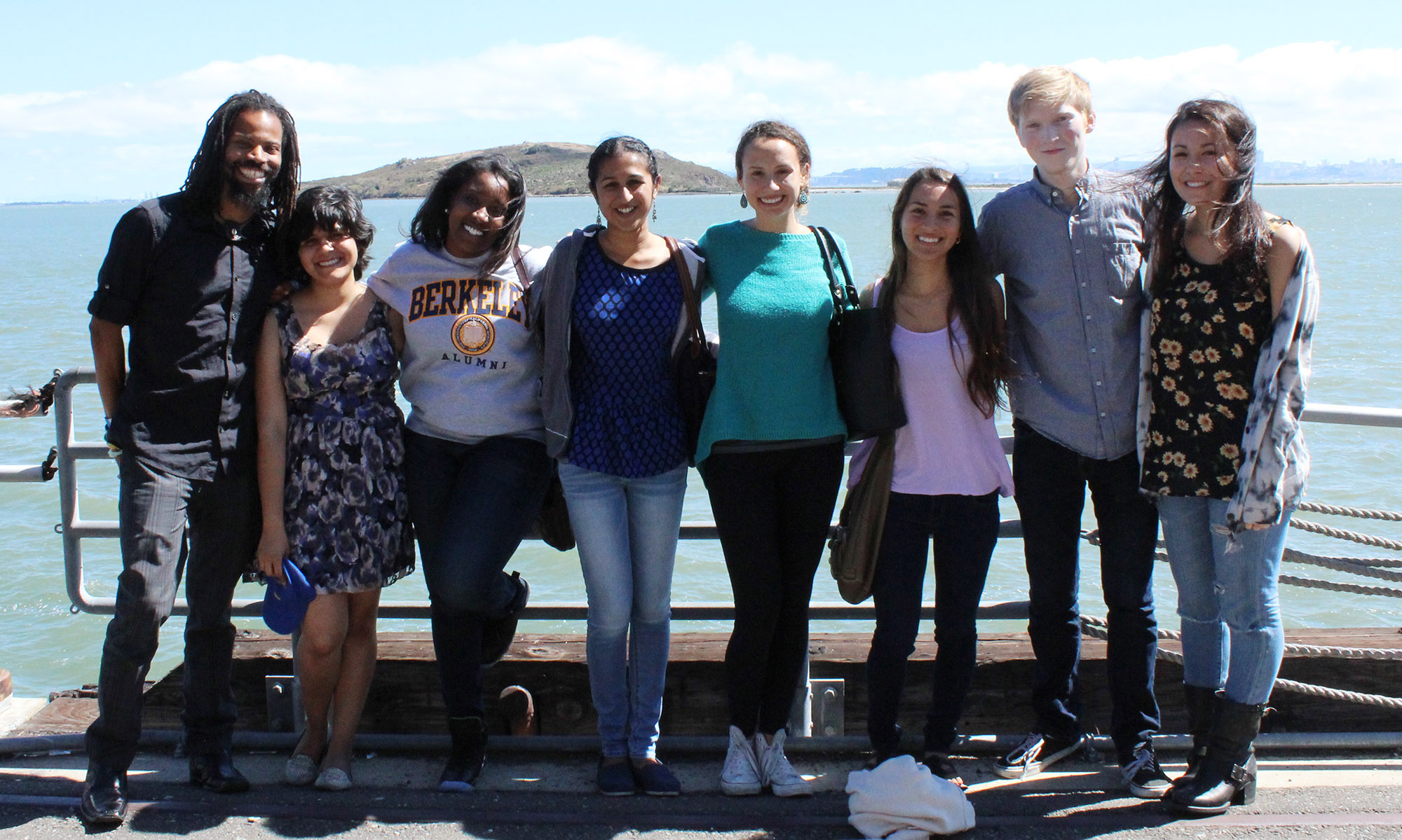
August 21, 2014
The Haas Institute recently planned a field trip to deepen staff’s understanding of the ongoing struggle for equity and justice in the Bay Area.
The 2014 Summer Fellows organized a field trip to the Rosie the Riveter World World War II Home Front, a national park located in Richmond, California, and Atchison Village, the first wartime housing project.
During World War II, the “second Gold Rush,” the city of Richmond experienced a huge population boom. The Richmond shipyards constructed more ships during WWII than any other in the country. While supporting the war effort, the city also experienced massive demographic changes that impacted housing, schools, and its economy.
The park and memorial focuses on the “Home Front” or wartime civilian life in Richmond.
 Park ranger Betty Reid Soskin discussed her experiences as a young African American woman during WWII at the Tuesday afternoon “Of Lost Conversations” discussion. At 92, she is the oldest full-time park ranger.
Park ranger Betty Reid Soskin discussed her experiences as a young African American woman during WWII at the Tuesday afternoon “Of Lost Conversations” discussion. At 92, she is the oldest full-time park ranger.
Ranger Betty discussed how her involvement helped change the development of the Museum, as many stories–like that of racial segregation and employment discrimination during and after the war–were originally left out of the site’s exhibits. As a lifelong Bay Area resident, she offered a game-changing perspective that altered the narrative when the park was being planned in the 1990s.
“What gets remembered,” Betty said, “is a function of who’s in the room, doing the remembering.”
Ranger Betty added that she never saw herself as a “Rosie the Riveter,” the iconic cultural image used to represent American women entering the workforce during the war.
“Rosie the Riveter is a white woman’s story,” Ranger Betty said. She shared the experiences of her family and others who worked in segregated auxiliary units during the war, as white unions controlled hiring. She also discussed the tragic 1944 Port Chicago explosion, and the subsequent mutiny that led to the desegregation of the U.S. armed forces.
"(RANGER BETTY'S) FIRSTHAND ACCOUNT UNDERSCORED THE STRIDES WE HAVE MADE IN THE U.S. TODAY TOWARDS RACIAL EQUALITY, BUT ALSO HIGHLIGHTED THE IMPORTANT WORK THAT WE STILL HAVE LEFT TO DO."
-Nadia Barhoum, researcher, Haas Institute
Betty’s story left a strong impression on Haas Institute fellows and staff.
“Betty’s story brought the history behind the museum to life,” said Nadia Barhoum, a researcher for the Haas Institute. “Her firsthand account underscored the strides we have made in the U.S. today towards racial equality, but also highlighted the important work that we still have left to do.” Barhoumd added that the economic impact of the shipyards and Chevron on Richmond’s economy illustrates the great importance of a strong economic framework to sustain people and the environment.
Richmond has the one of the highest concentrations of low-income renters in the region, according to a recent analysis by the Haas Institute. With UC Berkeley’s recent proposal for a second campus of the Lawrence Berkeley National Laboratory has many community residents concerned about potential rent increases and displacement. Nearly half of renters in Richmond pay more than 30 percent of their income to pay for their housing. The majority of residents near the proposed second campus are renters.
Understanding this history is important when considering policies and their impacts on communities today.
“It’s really important that we learn our local histories and keep threading together these connections over time so that we can better understand our stories of today and tomorrow,” Barhoum said.
 The group later visited Atchison Village in North Richmond, the first wartime housing project for defense workers which was later converted into a housing cooperative. Although initially reserved solely for white defense workers, the village has grown more diverse over time, providing an affordable homeownership option for residents. African American activists living in Atchison Village provided a tour of the cooperative and other locations nearby.
The group later visited Atchison Village in North Richmond, the first wartime housing project for defense workers which was later converted into a housing cooperative. Although initially reserved solely for white defense workers, the village has grown more diverse over time, providing an affordable homeownership option for residents. African American activists living in Atchison Village provided a tour of the cooperative and other locations nearby.
“I think Atchison Village is a very important perspective when looking at the affordable housing issues facing the Bay Area,” said Sharanya Sriram, a summer fellow at the Haas Institute. “A cooperative model seems to serve well for low-income housing.” Sriram, who is also a fellow at the Roosevelt Institute, spent this summer researching policies that would promote affordable housing in the region. In a recent blog post for the Haas Institute, she highlighted the Berkeley Student Cooperative and other policies to promote the availability of low-income housing.
Richmond, California’s motto is, “The City of Pride and Purpose.” Too often, the city receives more attention for crime and other controversies, instead of the innovative work its government and community activists do to prevent housing foreclosures, promote environmental justice efforts, and encourage the health communities.
The group ended the trip with a visit to the Green Belt, a location with community gardens and murals. “It presented an image of hope within neighborhoods that are struggling, displaying a promising future for community development in Richmond,” Sriram said.
Last year’s fellows attended a guided tour by former Black Panther Chief of Staff, David Hilliard.
The Haas Institute’s summer Fellowship program connects students and recent graduates with researchers to assist with research that promotes racial and social justice.

Images: Top, Haas Institute Fellows and Staff with National Parks Ranger Betty Reid Soskin; Assistant Director Stephen Menendian listens as Ranger Betty discusses MacDonald Avenue in its heyday; left, community activists discuss the history of Atchison Village in Richmond, California; above, 2014 Summer Fellows: from left, Rasheed Shabazz, Natalia Reyes, Jasmine Sadat, Sharanya Sriram, Magali Duque, Monica Elizondo, Thomas Nolan, and Chloe Tarrasch. Photos by Rasheed Shabazz and Eli Moore.
Rasheed Shabazz is a Haas Institute Communications Fellow. He graduated from UC Berkeley in 2013 with Bachelors degrees in African American Studies and Political Science.
The ideas expressed on the Haas Institute blog are not necessarily those of UC Berkeley or the Division of Equity & Inclusion, where the Haas Institute website is hosted. They are not official and not of one mind. Thoughts here are those of individual authors. We are committed to academic freedom, free speech and civil liberties.




